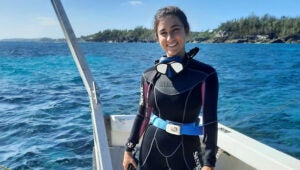My internship protecting the reefs in Bermuda

Name: Natalia E. Padillo-Anthemides
Hometown: My mother is from Greece and my father from Spain, but I was born and raised in the USA primarily in Miami.
What is your major? Marine biology with certificates in Middle Eastern and Asian Studies; Global Learning Medallion Student
Where did you intern? Bermuda Institute of Ocean Sciences (BIOS), St. Georges, Bermuda
What was your title? National Science Foundation (NSF) – Research Experience for Undergraduates (REU) intern.
How did you get your internship?
I heard about it through the FIU marine biology listserv managed by Laura Garcia Barcia. I learned about it a week before the deadline but decided to try and see if I would get it. If it were not for my phenomenal professor Heather Bracken-Grissom’s promptness and diligence in helping me out, this definitely would not have happened.
What were you doing there? At BIOS, I was working under the mentorship of marine benthic ecologist Yvonne Sawall studying carbon cycling in reefs.
What projects did you work on?
My project investigated the dominant reef photosynthesizers—common Bermudan coral and algae—and their total carbon intake and output. By using a combination of oxygen, light and temperature sensors in outdoor aquarium chambers, I measured gross photosynthesis and respiration. The goal of the research was to create a model for the diurnal (daily) pattern of oxygen-carbon dynamics for application to the carbon budget of coral reefs, which face degradation and elimination due to ocean acidification, warming oceans, bleaching, eutrophication and coastal erosion.
How does your internship connect back to your coursework?
My internship greatly enhanced my coursework and vice versa. From diving into the books during late nights studying and days on end testing my knowledge to diving into the waters of a pristine place, the experiences engrained all the lessons learned at FIU. This experience has solidified my resolve to go to grad school soon after graduating, as I fell in love with my daily routine and work.
What is the coolest thing that happened during your internship?
The coolest thing that happened was spearfishing! I was on my last dive in Bermuda one week before the program ended; Alex Chequer, the charismatic dive safety officer of BIOS, organized our last recreational snorkeling/dive trip; and, without fail, he always takes his spear and Lionfish dungeon with him.
What have you enjoyed most about your experience?
I enjoyed learning from all my friends and their own research projects and perspectives, and, in hindsight, making mistakes throughout the process. It brought me closer to my mentors. Receiving critiques may seem daunting to face and expose your mistakes; in reality, I felt empowered and motivated to take action for my future.
What have you learned about yourself?
I learned that I cannot do anything alone, in the same way, that marine science requires “all hands on deck”; we all, from different interdisciplinary backgrounds, must collaborate in order to truly advance science and to improve communication. Many times, I required their analytical input as well as physical help to aide in my project. For practical skills, I learned that I need to organize information better when reading countless tabs of research papers, which I will later use!
What advice do you have for those beginning the internship process?
Take responsibility and do not repress your enthusiasm. Act on instinct! I think it comes off better when a mentee/student reaches out first, no matter when or what it is, to show eagerness to work. When you care about your project, it shows. So don’t try to hide it!
Additionally, I encourage you to apply to anything and everything! Once you’ve edited and perfected (with help of friends and colleagues) your resume, CV, and make a basic structure of your cover letter, the hardest part is done!
Next, look out for opportunities! LinkedIn, Handshake, FIU Career services, FIU advising, Global Learning office, FIU professors, and their labs… there are so many choices!
How has the position increased your professional confidence?
Although my project is the improved part of a preliminary experiment from an REU 1 year ago, I still felt like I had ownership over the project and felt the responsibility to carry it through successfully, and my mentor was patient with my learning curve of project-pertinent skills. This project experience allowed me to present my research several times in an auditorium, communicate concepts and data to various audiences (fellow friends/researchers, senior scientists, school children, etc.)
Writing a research paper, I feel much more confident to take on future projects in labs and beyond, which prepares me to ultimately gather all these skills, fine-tune and then apply them for future solo Ph.D. work!
How has the internship expanded your professional network?
One of the internship goals highlighted in the REU program is for our network to expand. All the other REUs selected were from all around the country, with varying academic backgrounds.
BIOS additionally hosted Canadian Associates of BIOS (CABIOS) interns, as well as having an existing history of an array of technicians and researchers from around the world! Within this environment, we had scientific development and networking workshops to professionally connect with staff at BIOS as well as recreational events and activities to loosen up and have fun. All the contacts I made will remain with me and I hope in the future to be of service to them as they have been so far with me in providing so much support, advice, and opportunities!
